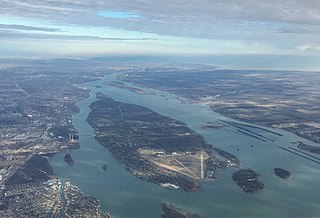A charter is the grant of authority or rights. Charter may also refer to:
A charter is the grant of authority or rights. Charter may also refer to:
Enterprise may refer to:
Windsor may refer to:
Huron may refer to:

Grosse Ile Township is a civil township of Wayne County in the U.S. state of Michigan. The population was 10,777 at the 2020 census.

The Canadian Charter of Rights and Freedoms, often simply referred to as the Charter in Canada, is a bill of rights entrenched in the Constitution of Canada, forming the first part of the Constitution Act, 1982. The Charter guarantees certain political rights to Canadian citizens and civil rights of everyone in Canada from the policies and actions of all governments in Canada. It is designed to unify Canadians around a set of principles that embody those rights. The Charter was proclaimed in force by Queen Elizabeth II of Canada on April 17, 1982, as part of the Constitution Act, 1982.

A marina is a dock or basin with moorings and supplies for yachts and small boats. A marina differs from a port in that a marina does not handle large passenger ships or cargo from freighters.
Algonquin or Algonquian—and the variation Algonki(a)n—may refer to:

A charter is the grant of authority or rights, stating that the granter formally recognizes the prerogative of the recipient to exercise the rights specified. It is implicit that the granter retains superiority, and that the recipient admits a limited status within the relationship, and it is within that sense that charters were historically granted, and it is that sense which is retained in modern usage of the term. In early medieval Britain, charters transferred land from donors to recipients.

The District Municipality of Muskoka, more generally referred to as the District of Muskoka or Muskoka, is a regional municipality in Central Ontario, Canada. It extends from Georgian Bay in the west, to the northern tip of Lake Couchiching in the south, to the western border of Algonquin Provincial Park in the east. A two-hour drive north of Toronto, it spans 6,475 km2 (2,500 sq mi). It has some 1,600 lakes, making it a popular cottaging destination.
A township in some states of the United States is a small geographic area.
Clarendon may refer to:
North Star is a name of Polaris in its role as northern pole star.
The beaver is a large semiaquatic rodent.

Most U.S. states and territories have at least two tiers of local government: counties and municipalities. Louisiana uses the term parish and Alaska uses the term borough for what the U.S. Census Bureau terms county equivalents in those states. Civil townships or towns are used as subdivisions of a county in 20 states, mostly in the Northeast and Midwest.

The official languages of Canada are English and French, which "have equality of status and equal rights and privileges as to their use in all institutions of the Parliament and Government of Canada," according to Canada's constitution. "Official bilingualism" is the term used in Canada to collectively describe the policies, constitutional provisions, and laws that ensure legal equality of English and French in the Parliament and courts of Canada, protect the linguistic rights of English- and French-speaking minorities in different provinces, and ensure a level of government services in both languages across Canada.

Britannia is a group of neighbourhoods in Bay Ward in the west end of Ottawa, Ontario, Canada. It is located on the Ottawa River across from Aylmer, Quebec, adjacent to its namesake, Britannia Bay, north of Richmond Road, west of the Kichi Zibi Mikan and east of Boyce Avenue. The total population of this area was 6,692 as of the 2016 census. The area constituted a municipal ward from 1973 to 1994.
Municipal corporation is the legal term for a local governing body, including cities, counties, towns, townships, charter townships, villages, and boroughs. The term can also be used to describe municipally owned corporations.
Local government in Canada can be defined as all elected local authorities which are legally empowered to make decisions on behalf of its electors, excluding the federal government, provincial and territorial governments, and First Nations, Métis and Inuit governments. This can include municipalities, school boards, health authorities, and so on.
A charterparty is a maritime contract between a shipowner and a "charterer" for the hire of either a ship for the carriage of passengers or cargo, or a yacht for leisure.
Local government in Pennsylvania is government below the state level in Pennsylvania. There are six types of local governments listed in the Pennsylvania Constitution: county, township, borough, town, city, and school district. All of Pennsylvania is included in one of the state's 67 counties, which are in total subdivided into 2,560 municipalities. There are currently no independent cities or unincorporated territories within Pennsylvania. There is only one incorporated town in Pennsylvania, Bloomsburg.